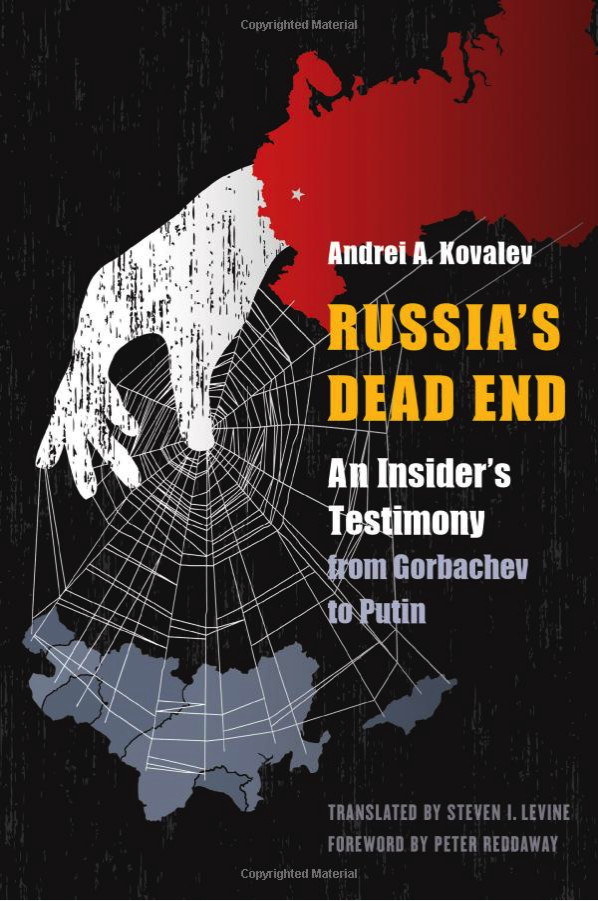| ||||||||||||||
by Andrei A. Kovalev ; translated by Steven I. Levine | ||||||||||||||
 |
KIRKUS REVIEW - Why will democracy refuse to take root in Russia?
In this trenchant exposé of Russia’s totalitarian pathology, Kovalev—who was a member of Mikhail Gorbachev’s secretariat and also worked in the foreign affairs ministry under Boris Yeltsin and Vladimir Putin—blames the country’s enduring “slave psychology” for many of its ills, from the time of the czars to the present. The author, whose high-level career took him into the apogee of government power and whose own father was an eminent Soviet diplomat, approaches the unending Russian cycle of tear-down, reaction, revanchism, and stagnation like a social psychologist. In his early job in the late 1980s, Kovalev worked on the “elimination of punitive psychiatry,” which has helped him diagnose Russia’s chronic problems. Perhaps his current exile in Belgium—he found the Putin regime to be too politically oppressive,” and he includes a horrifying chart delineating the attacks on and murders of journalists and editors since 2001—has allowed him the freedom to skewer the unchecked power of the “secret services,” which took on new life after the failed 1991 coup against Gorbachev. Kovalev methodically works through the stages of this failed coup as reflections of the same “monster” of totalitarianism that the liberal reforms of Gorbachev were supposed to eliminate. Under Yeltsin, a “new elite” formed (really just a replica of the old elite), assuming new powers under former KGB chief Putin, whose apotheosis demonstrated that the Russian population could still be manipulated into “subordinat[ing] its own real interests to the sham interests of the state.” Moreover, Putin capitalizes on the Russian sense of nostalgia for the strong-armed leader who reverts to the familiar ideological dogmatism, sounding the hollow notes of the “National Idea”—i.e., patriotism, Russian Orthodoxy, suspicion of mysterious “interventionists,” need for secrecy, renewed imperialism, infantilism, xenophobia, and so on. Ultimately, Kovalev brings us back to the totalitarian state that won’t go away.
Too dense and scholarly for some general readers but astonishing in its relentless frankness and a refreshing report from an insider.
In this trenchant exposé of Russia’s totalitarian pathology, Kovalev—who was a member of Mikhail Gorbachev’s secretariat and also worked in the foreign affairs ministry under Boris Yeltsin and Vladimir Putin—blames the country’s enduring “slave psychology” for many of its ills, from the time of the czars to the present. The author, whose high-level career took him into the apogee of government power and whose own father was an eminent Soviet diplomat, approaches the unending Russian cycle of tear-down, reaction, revanchism, and stagnation like a social psychologist. In his early job in the late 1980s, Kovalev worked on the “elimination of punitive psychiatry,” which has helped him diagnose Russia’s chronic problems. Perhaps his current exile in Belgium—he found the Putin regime to be too politically oppressive,” and he includes a horrifying chart delineating the attacks on and murders of journalists and editors since 2001—has allowed him the freedom to skewer the unchecked power of the “secret services,” which took on new life after the failed 1991 coup against Gorbachev. Kovalev methodically works through the stages of this failed coup as reflections of the same “monster” of totalitarianism that the liberal reforms of Gorbachev were supposed to eliminate. Under Yeltsin, a “new elite” formed (really just a replica of the old elite), assuming new powers under former KGB chief Putin, whose apotheosis demonstrated that the Russian population could still be manipulated into “subordinat[ing] its own real interests to the sham interests of the state.” Moreover, Putin capitalizes on the Russian sense of nostalgia for the strong-armed leader who reverts to the familiar ideological dogmatism, sounding the hollow notes of the “National Idea”—i.e., patriotism, Russian Orthodoxy, suspicion of mysterious “interventionists,” need for secrecy, renewed imperialism, infantilism, xenophobia, and so on. Ultimately, Kovalev brings us back to the totalitarian state that won’t go away.
Too dense and scholarly for some general readers but astonishing in its relentless frankness and a refreshing report from an insider.
Catégorie : Russie | Type : Littérature
Bordereau → notice (réservé) | Inscription | Liens → agenda similaires | livres-souvenirs | Privé